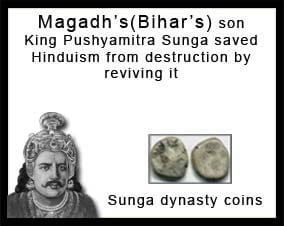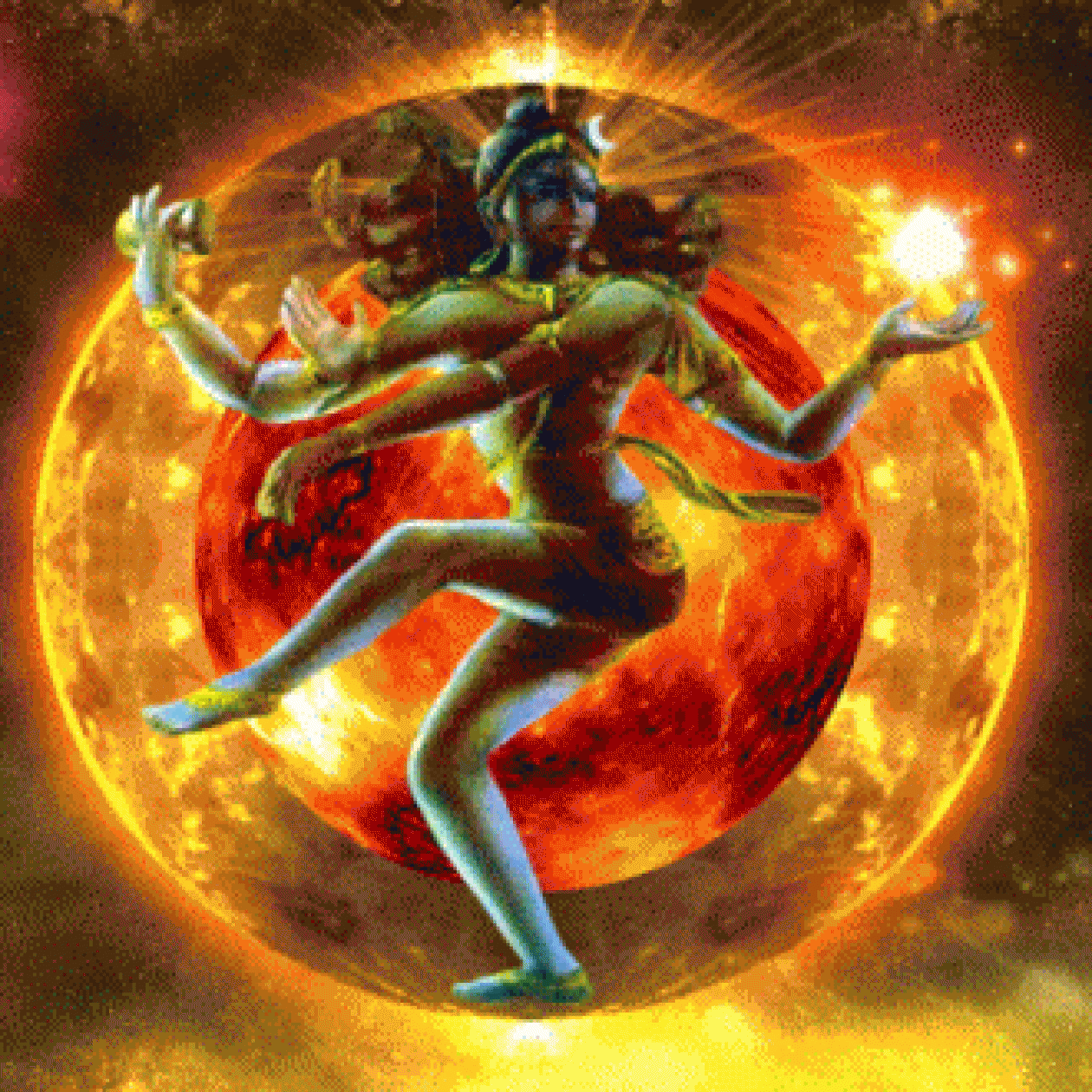Bihar’s king Shung destroyed Greeks
#Unsungheroesofhindustan

PUSHYAMITRA SHUNG – DESTROYER OF GREEKS.
Pushyamitra Shunga was the founder and first ruler of the Shunga Empire in East India. He was the hereditary ruler of Vidisha. He was a Brahmin by birth . He was,: moreover, a staunch supporter of the Vedic religion and Indian nationality , and a devotee of Lord Shiv” . His family
name was Shung . Even in the Magadhan army he hadattained so much importance because of his military exploits, that Brihadrath Maurya himself had appointed him ,not very willingly but only out of necessity, to the office of the Commander-in-Chief of the forces in the face o f the deadly war with the invading Greeks. Th e moment he got the reins of the highest military authority ,Pushyamitra began to
enlarge and reorganize the army of Magadha , and equipped it with all the weapons. He has been described as the destroyer of Greeks in indian history.
Samrat Chandragupta had defeated Seleucos Nicator and driven away the Greeks far beyond the Hindukush
mountains round about 315 BC. Seleucos had established his independent Greek king domin Bactria adjoining the western side of the Hindukush mountains which was then the extreme frontier of India . As
it was independent, it had lost every contact with the original distant European Greek state. If at all there existed any
contact between the two , it was that of dire enmity . These Bactrian Greeks, therefore, were called Asian Greeks. Because of the break in the continuity during the intervening hundred years or so, these Bactrian Greeks had fallen off
miserably in every respect from the high standards of the original Greeks of Alexander’s time . They had now nothing
of the spirit and vigour of their Alexandrian ancestors. Alexandrian ambition of conquering India , however, stillgoaded them on . As soon as they saw the degeneration of the military strength of the Maurya empire , these Bactrian
Greeks were fired with the malicious ambition of Indian conquest and Demetreos, their king at that time , crossed the Hindukush and attacked
India As the Indian army offered no resistance worth the name , Demetreos reduced Kamboj , Gandhar and crossed theIndus, and conquering the whole of Panchnad , that Yavanadhip (the Greek King ) proceeded wit h his army to conquer Magadha itself.The whole of the Greek army was inspiredwith the war like spirit and they began to declare that they
were going to realize the dream of the Indian conquest of Alexander.
Unfortunately ,they had no political power left in the north of India which could immediately resist this national calamity . But within a decade of Asoka’s death the provinces of Kalinga and Andhra in south India had renounced the paramountcy of the Buddhist Mauryas and established their independent kingdoms . The news that the Greeks had conquered northern India , and that the Magadha king , a weak Buddhist , could not at all resist it , caused a great furore amongst the Vedic population in South India . At last,
the king of the independent State of Kalinga , the valiant Kharvela , decided t o march himself at th e head of an army
against the Greek army o f Demetreos.
Greek army was decisively beaten by the kalinga king.After driving the Greeks beyond the frontiers of India , Kharvel a did not find much time either to pursue the fleeing enemy or to organize the administration of the whole of that region. Political emergency drove him back to
Kaling a almost immediately . He did not dethrone the Maurya emperor of Magadha , King Brihadrath . Seeing that Kharvela had returned to the south
Menander, who ha d so far stabilized his position in Kamboj and Gandhar and who was furious a t the disaster met with by
Demetreos on his march against Magadha , once again invaded India within a period of four years. As at the time of the invasion of Demetreos so also at this time the Greeks did not meet wit h any opposition worth the name in the Panchnad , which was dominate d b y the Buddhists and , as such, had become pacifist. The weak descendant o f Asoka on the throne o f Magadha , too offered no effective resistance .
On the contrary , Menander could enlist the sympathy of many of the Buddhists in his campaign . For he openly said that he approved o f many of the Buddhist
principles an d that he was soon going to become a convert to it. So , many Buddhist preachers began t o publicise thatthe Greeks ha d come t o fight wit h the Vedic Hindus alone and tha t if the y conquered Indi a theirs would be a Buddhist rule ! The Buddhists were not much concerned with the alien nationality of the Greeks. Buddhism did not recognize the differences o f caste, race or nationality ! This was the anti-national an d anti-Indian wicked way in which the
Buddhist preachers began to delude the people of India !
As their sympathetic assistance was so useful to Menander, he too began to circulate through his Greek agents that this campaign of his was directed solely to nip in the bud the conspiracy o f the Vedic Hindus to snatch away the imperial
power from the hands of the weak Buddhist rulers of Magadha. Menander came once again reducing the Panchnad
and other provinces right up to Ayodhya . In order to avoid the repetition of the sad plight of Demetreos who had made undue haste at an inopportune time , Menander spent some time in Ayodhya consolidating the newly won territories and replenishing his army before he launched an attack on Magadha and waited for the auspicious moment .
The Vedic community and their leaders in North India had already experienced a surge of heroic spirit because of the victory of the brave Kharvela of Kalinga .
T o add to it the news arrived of Menander’s manacing invasion ! Besides, the Indian Buddhist populace showed clear signs of defection and betrayal of their co-nationalists to Menander. The nationalist Indian leaders, therefore, formed a revolutionary bod y wit h a vie w to dethrone the vacillating and weak Brihadrath Maurya from the royal seat of Magadha and replace him with one of the Vedic sect, who was of prove n metal like Chandragupt a Maurya . But everybody was confronted with the difficult question as to who was there so bold and powerful as to take .This momentous event took place round about 185 B . C. ” and with all the Vedic rituals Pushyamitra was appointed Emperor of India on the throne of Asoka in Pataliputra . It marked the end of the Maurya dynasty and the beginning of the reign of the Shungas.First of all , Pushyamitra stabilized the administrative setup and consolidated his position in his capital and the regions around it and after mobilizing a strong four-fold army , eager to fight, he fell upon Menander who had so far dug in his feet safe in Ayodhya .
Finding it extremely difficult to hold their ground before the mighty arms of the
Indian army , the Greek general,Menander began to retreat. Earlier Demetreos had not been pursued; but this time Pushyamitra was not going to be slack. He chased and hunted down the Greek army . Inflicting defeat after defeat
on the Greek army and causing confusion in their ranks, Pushyamitra drove the dispirited and vanquished Menander
far beyond the Indus. The Indian empire right up to the Indus was once again set free from the Greek political dominance.e the lead in this national revolution and to destroy the Yavanas (the Greeks) completely .
This was the last of the Greek aggressions on India . This terrible defeat inflicted on the Greeks by Pushyamitra consumed their strength so much that they never had the heart to strike again at Bharat any time in future ! Bharat thus annihilated this Greek enemy who had been a
source of constant trouble since the time of Alexander. Pushyamitra annexed all the territory liberated from the Greek hands to his own empire. He appointed at Ujjaiii his son, Agnimitra , as the viceroy of the region. General Agnimitra was a brave and able commander like his father.
He forced the land upto Vidarbha in the South to acknowledge his overlordship .
Pushyamitra , who had completely destroyed the Greeks, the age-old alien enemies of the nation , and rejuvenated the Indian empire , had acquired with his own splendid victories the right to perform ashvamedh according
to the Vedic tradition . About this right of Samrat Pushya mitra Vincent Smith writes in his Early History of India (1924), “The Yavanas and all other rivals having been
disposed of in due course, Pushyamitra . was justified in his claim to reign as the paramount power of north India and straightaway proceeded to announce his success by a magnificent celebration of the Ashvamedha Sacrifice at his capital .
This declaration of celebrating a ashvamedhby Samrat Pushyamitra tlirilled the whole country , barring the minority community of the Buddhists, with national pride and martial triumph . In the very capital of Asoka , who had deprived the Vedic Hindus of their religious freedom by means of his supreme political authority , was this Ashvamedha of Samrat Pushyamitra to be performed . This Ashvamedh of Pushyamitra was in fact a public imperial proclamation of Samrat Pushyamitra that all the restrictions imposed by Asoka on the religious freedom of the Vedic
Hindus were withdrawn .
In traditional historical writings, mainly based on Buddhist myths, Asoka has been extolled as tolerant of different religious sects while Pushyamitra wholly conniving at his efforts to establish religious freedom, is generally imputed with intolerence and persecution of the Buddhists. This false notion has to be corrected. If anybody is at all guilty o f religious intolerence , it was Asoka himself. For , not only with verbal propaganda but with the abuse of his regal authority he declared as illegal all the fundamental religious rituals, such as sacrifices by the Vedic Hindus who formedthe majority of his subjects. But Pushyamitra did not issue any royal decree enforcing any performances of sacrifices in the Buddha Viharas or the worship of Vaishvadeva in every Buddh household, even as a fitting retort to Asoka’s injunctions. The Buddhists were as absolutely free as all other religious sects to perform their religious rites and enjoy
religious freedom, so long as they abstained from any anti national foreign contact. It is likely that in the troubled times of national war the chastisement of the disloyal Buddhists might have affected some of the innocent ones. But it was
not a rule—but an inevitable exception !
What Pushyamitra really did was to reinstate the religious freedom which was annulled by Asoka . If anybody is to be called intolerent of religious differences, it should be Asoka and not Pushyamitra. Pushyamitra who , with his armed might , completely exterminated the Greek intrusion which from the time of Alexander had often caused great harm to India , and who , therefore, rightly deserves the title , ‘Yavan-destroyer, ‘
protected ably for 36 years not only the independence of India which he himself had won , but brought about the many
sided development of his country and then died peacefully in 149 B.C .
Reference – Six glorious epochs of indian history by veer savarkar.
Sourya Jaiswal







